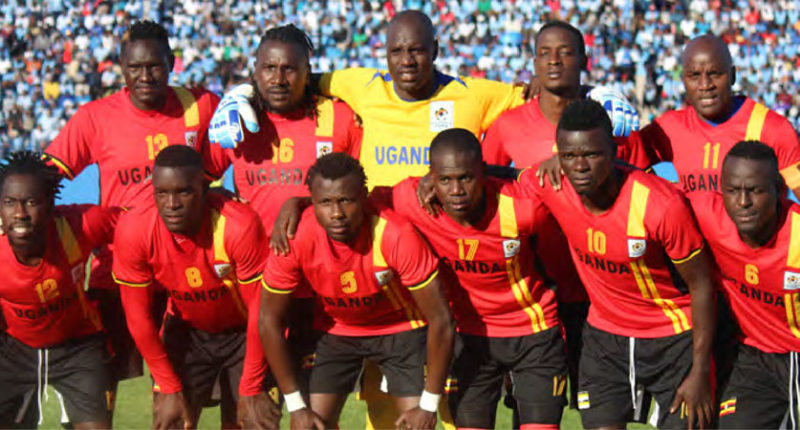Uganda’s first appearance at AFCON in nearly forty years is now a distant memory. To some people, it’s like Uganda did not even take part in the tournament, never mind that CNN honored mid fielder Farouk Miya with the goal of the tournament award.
Uganda’s first AFCON appearance after a 38-year absence served up many lessons, not just for the footballers but also the coaches, sports administrators, the government and even the fans.
The euphoria was quickly washed away as soon as Ugandan players stepped on the turf. Some observers pointed out that the stage fright Cranes players faced was just a sideshow to the inadequacy of their preparation.
When Uganda beat Comoros 1-0 at home to finally qualify for the 2017 African Cup of Nations (AFCON) in Gabon after 38 years, the whole country went into celebratory mode for three months. The many near misses and heartbreaks were quickly forgotten. This feat was a respite for a country just reeling from its most contentious election in a generation.
But the real challenge would still lie ahead: the daunting task of competing in the continent’s biggest showpiece and getting away with a result. Coach Milutin Micho Sredojevic knew that a win would bring a semblance of victory to the millions of Ugandans back home.
The only East African nation competing in the 2017 AFCON, Uganda was matched against continental giants Mali, Egypt and Ghana in what would turn out to be the “group of death”. And as expected, the Cranes failed to measure up, losing twice in a row to seal their exit. The Cranes’ disappointing turn out in Gabon draws critical lessons we need to take away for a country beaming with talent but bogged down by authority.
Consistent continental participation
The Moses Magogo-led Federation of Uganda Football Association (FUFA) administration laid out qualifying for the AFCON 2019 as a main objective in their strategic plan.
As realistic as this objective may be, playing in the knockout rounds or even winning the competition should be the ultimate target. But this can only be achieved by qualifying for and playing in every AFCON tournament. The AFCON 2017 quarter finalists (Egypt, Cameroon, Burkina Faso, Morocco, Tunisia, DR Congo, Ghana and Senegal) have all maintained a significantly consistent level of participation in back to back AFCON tournaments; a reason they have, arguably, managed to progress to higher levels of the competition and/or gone ahead to win it.
Playing at the big stage more frequently will familiarize the Cranes with bigger teams and boost their confidence and playing style.
Revise government support and funding
Uganda is one of the few countries in Africa where issues of national sporting teams are independently funded by their respective federations. Countries like Nigeria, Senegal, Egypt, and Zambia have their governments fully funding their national teams’ campaigns.
Many times, Cranes’ previous continental and world cup qualification campaigns were jeopardized by poor funding and support. Under the 1964 National Council of Sports Act, FUFA is mandated to fund the activities of the national team. The government has always only provided courtesy last minute support, where the president is pictured handing over the money, a move many enthusiasts deem as ‘political’.
In September 2016, Members of Parliament passed a motion for the government to take charge of fully funding the national team activities.
“We need a new law that will take care of the millennial changes in the sports sector. In Kenya, it’s the command of the law for government to take full responsibility of funding national teams,” Hon. Hamson Obua told Parliament.
After the successful qualification campaign for AFCON 2017, FUFA owed the coach Shs235m – more than five months’ salary arrears, reimbursements and bonuses. “Uganda is the only country in Africa that has qualified with only rare occasional government support,” a frustrated Micho told the press four days after guiding the Cranes to the AFCON. “We must address the challenges that the team faces, which may not allow us to qualify again. Uganda is the only country with a manager who is not only poorly paid but even the little pay is not forthcoming. It is only promised to him,” Allan Ssewanyana, a sports pundit and now Member of Parliament for Makindye in Kampala, said while addressing Parliament.
In preparation for Gabon, FUFA submitted a budget of Shs7.5 billion, which was cut down to Shs4.4 billion by the Ministry of Education and Sports and the National Council of Sports. This money still came later than it was expected.
Additionally, each of the 449 MPs and ex-officios contributed Shs500, 000 (in total Shs224 million) to the Uganda Cranes, as a ‘token of appreciation’ and to support their campaign in Gabon. Government provided FUFA with just over a billion shillings in the AFCON 2015 qualification campaign alone.
It is obvious that the poor and late funding passed a ray of frustration on the team’s preparations in the build up to the tournament.
“I know one country you steal trillions from people’s roads and you eat big enjoying life or you make millions happy and proud through football and you eat nothing,” Micho tweeted.
Sorting out this mess will require the amendment of the existing law so that government can be charged with the timely and full funding of national teams across all sporting activities.
Develop structures
Uganda and the DRC had the fourth highest number of domestic-based players (five) at this year’s AFCON. This number was only bettered by Tunisia, Egypt and Zimbabwe’s 15, 12 and seven respectively. This points to the growing strength and potential of the national league to produce competitive and prolific players. There is more public involvement in the development of the local football. These leagues provide a platform for young talent to develop, and creates exposure for them to be identified for more professional roles.
The professionalization of the Azam Uganda Premier League was the best thing to happen to Ugandan football ever. The requirements of improved infrastructure, legitimate player certification and better marketing have all but grown local football.
Uganda’s top clubs – KCCA FC and Vipers FC – have taken the lead in developing modern football infrastructure, through upgrading the Philip Omondi and the St Mary’s Kitende stadiums, respectively.
FUFA is considering a bid to host the 2025 AFCON, but this will only be possible with suitable facilities in place. Hosting the tournament comes with significant infrastructural development. The construction of world class stadiums and training facilities will come as a boost to local clubs.
Every Municipality in Uganda has government owned sports grounds that have not been developed since the 1970s. If government is to develop these facilities through Public Private Partnerships, then there will surely be better avenues for the development of local football. Qualifying for AFCON 2017 came after close to four decades of hard work, the agony of near misses and persistent numerous attempts. The continent surely missed Ugandan football but whether the country shall stay at the top or take another break from the top is dependent on the government’s and FUFA’s will to make the necessary changes to the management and development of the sport.






